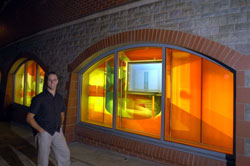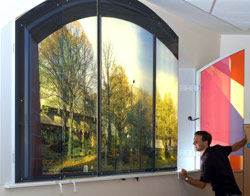Bristol University Department of Neuroendocrinology
A new art installation entitled Double Gazing by Anna Heinrich and Leon Palmer has been integrated into the Dorothy Hodgkin Building, Bristol University's new £18.75m centre for stress research. It is installed in five large, arched windows in the Marlborough Street frontage of the building where it will be seen by tens of thousands of passers-by every day. The project is linked to Bristol's award-winning Legible City Initiative, which aims to improve residents' and visitors' understanding, experience and enjoyment of the city and to connect people with places.

Double Gazing, digital window installation by
Anna Heinrich and Leon Palmer, 2004
The work consists of 25 light-emitting boxes built as shutters, made of a transparent film material called Duraclear, into which stylised images of interior and exterior views of the building have been embedded. Short films stored on DVDs will be projected from inside the building onto the light boxes at peak times of the day.
From the outside, passers-by will see a colourful stylised representation of the inside of the research building taken from the architects plans. Set into this are five screens, three of which will show specially made films inspired by some of the fundamental ideas in bioscience. In each film, shadowy figures make patterns using coloured blocks to illustrate the structure of DNA, apoptosis (the process by which cells can trigger their own death), molecular recognition (how molecules recognise their partners) and randomised trials (how random allocation is used in clinical trials).

Double Gazing (detail), view from outside building
Anna Heinrich and Leon Palmer, 2004
What the passer-by cannot see is that the other side of the windows carry high resolution images of the street outside on a sunny day ñ representing the scientists' view of the outside world. The difference between what the public outside and the scientists inside see is captured in the artwork's title, Double Gazing.

Double Gazing (detail), view from inside builiding
Anna Heinrich and Leon Palmer, 2004
The key people behind the development of the Dorothy Hodgkin Building decided at an early stage that it should incorporate art. Stafford Lightman, Professor of Medicine and Director of the University Research Centre for Neuroendocrinology, said: "The idea of a major new science building without art appals me - I think there's far too little mingling of the disciplines. Science is relatively unpopular and needs to reconnect with the wider world. And the challenge for artists is to think about scientific concepts and put them into a form that speaks to the public in an arresting manner ñ one that conveys something of the depth, complexity, uncertainty and excitement of scientific processes."
Professor Lightman and colleagues at the University worked with a range of people outside the University to devise the project brief, draw up a shortlist of artists and make the final selection, including: Denna Jones, Curator of the Two Ten Gallery and Contemporary Initiatives at The Wellcome Trust; Caroline Collier, Director of Bristol's Arnolfini; Alastair Snow , Senior Public Arts Officer for Bristol City Council; and Tim Stevens, a partner in Kendal Kingscott and principal architect of the Dorothy Hodgkin Building.
The commission was made possible by a £50,000 Principal Institutional Science and Art Grant from the Wellcome Trust and a £30,000 grant from Arts Council England.
Follow this link to download an artists' statement by Anna Heinrich and Leon Palmer about 'Double Gazing' in Rich Text Document format: 17 Mb


